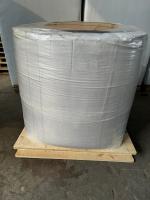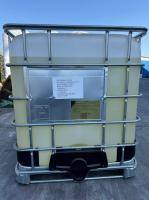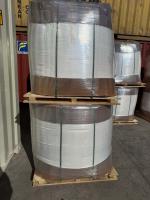Our Products
Polyacrylamide / equivalent model of 640HIB can be replaced by Chinafloc EMNR880HD

Highly branched cationic polyacrylamide emulsion (640HIB) is a specialized high-performance flocculant designed for advanced solid-liquid separation processes. As a cationic, water-soluble polymer with a branched molecular architecture, it offers unique advantages over traditional linear polymers in terms of floc size, floc strength, drainage efficiency, and performance in difficult-to-dewater sludges.
This product is typically supplied as an oil-in-water emulsion and is highly effective in a wide range of industrial and municipal wastewater treatment processes. The “highly branched” structure provides more functional cationic sites and polymer chain ends that facilitate fast and durable floc formation. Its primary applications are in sludge dewatering, wastewater clarification, oil-contaminated sludge treatment, and high-shear system flocculation.
1. Municipal Sludge Dewatering (Primary Application)
The foremost application of 640HIB is in the mechanical dewatering of municipal sewage sludge, particularly waste activated sludge (WAS) and mixed primary/secondary sludge. These sludges are often difficult to dewater because of their colloidal and hydrophilic nature.
Application Method:
-
It is dosed just before the dewatering device such as a belt filter press, screw press, or decanter centrifuge.
-
Once mixed with the sludge, 640HIB rapidly forms robust flocs that resist shear and enhance water release.
Key Benefits:
-
High Cake Solids Content: Allows the production of drier sludge cake, reducing transportation and disposal costs.
-
Low Filtrate Turbidity: Ensures high-quality water separation, minimizing the burden on downstream treatment.
-
Low Polymer Dosage: Due to high molecular activity and efficient branching, less polymer is needed compared to linear products.
2. Industrial Sludge Treatment
640HIB is widely used in various industrial wastewater treatment facilities to dewater sludge originating from:
-
Food & beverage industries
-
Pulp & paper mills
-
Petrochemical plants
-
Textile and dyeing factories
-
Tannery and leather processing
These industries often generate sludges with a high content of organic matter, grease, fibers, or colorants, all of which are difficult to process using conventional flocculants. The highly branched structure of 640HIB enables it to:
-
Withstand high-shear mixing
-
Bind fine and oily particles
-
Enhance drainage even in thick, viscous sludge
3. Centrifuge Conditioning
In high-speed centrifugation systems, sludge is subjected to extreme shear, which often breaks down conventional flocs. 640HIB forms flocs with high mechanical stability, capable of maintaining structure under such stress. The result is:
-
Improved solids capture
-
Lower torque on the centrifuge
-
Better dewatered cake formation
-
Minimal re-suspension of solids
This makes it ideal for modern, continuous centrifuge-based sludge management systems used in both municipal and industrial applications.
4. Belt Filter Press and Screw Press Performance Optimization
Belt filter presses and screw presses rely heavily on polymer flocculants for effective operation. 640HIB excels in these applications because:
-
Its branched structure enables the formation of larger flocs with improved drainage pathways.
-
It leads to faster initial drainage, reducing water retention in the cake.
-
High floc strength reduces floc breakage, which translates to more stable operations and cleaner filtrate.
5. Treatment of Oil-Contaminated or Greasy Sludges
Sludges contaminated with oils or grease (such as from oil refineries, meat processing plants, or dairy effluent) are notoriously hard to treat due to the hydrophobic and emulsified nature of contaminants.
640HIB offers:
-
Strong affinity to oily particles due to its cationic nature
-
Capability to break emulsions and enable water separation
-
Effective performance without needing excessive coagulants or demulsifiers
6. Wastewater Clarification and Solids Removal
While primarily used for dewatering, 640HIB is also effective in wastewater clarification, especially in systems requiring quick floc formation and high floc durability.
Applications include:
-
Settling tanks or lamella clarifiers
-
DAF (Dissolved Air Flotation) units
-
Thickening tanks
In these systems, 640HIB promotes rapid floc formation and sedimentation, effectively reducing:
-
Suspended solids (SS)
-
Turbidity
-
Color (especially in dye and textile wastewater)
-
Organic loading (COD/BOD)
7. Effective in Variable Operating Conditions
640HIB is formulated to perform reliably even in difficult environmental and process conditions, such as:
-
Low-temperature systems: Fast hydration and solubility even in cold water.
-
High conductivity or saline water: Stable performance in brackish or seawater-based sludge systems.
-
Short retention times: Fast-reacting flocculation ideal for high-throughput or compact systems.
8. Environmental and Operational Advantages
Using 640HIB not only enhances technical performance but also offers broader benefits:
-
Reduced energy consumption: Drier cakes mean less water to evaporate or transport.
-
Lower chemical usage: Due to its efficiency, less coagulant or secondary flocculant is required.
-
Improved effluent quality: Less carryover of fine particles or residual organics into treated water.
-
Compliance with environmental discharge standards: Cleaner filtrate ensures regulatory adherence.
Summary of Key Features:
| Feature | Advantage |
|---|---|
| Highly branched molecular design | Superior bridging, stronger and larger flocs |
| High cationic charge density | Excellent affinity for negatively charged sludge components |
| Emulsion format | Quick solubility and ease of handling |
| Compatible with all dewatering systems | Versatile in centrifuges, belt presses, screw presses, etc. |
| Suitable for organic and oily sludges | Effective in food, petrochemical, and textile wastewater |
Conclusion
Highly branched cationic polyacrylamide emulsion (640HIB) is a robust, advanced flocculant offering unmatched performance in sludge dewatering, wastewater clarification, and solids-liquid separation. Its unique molecular architecture results in strong, shear-resistant flocs that dramatically improve the efficiency of mechanical dewatering systems while minimizing polymer consumption and operational costs. Whether used in municipal WWTPs or challenging industrial environments, 640HIB stands out as a next-generation solution for modern water and sludge treatment needs.





